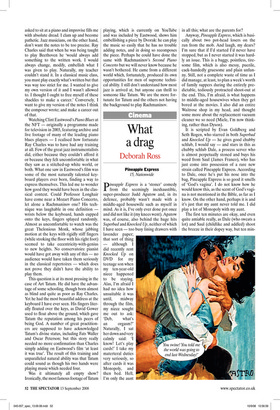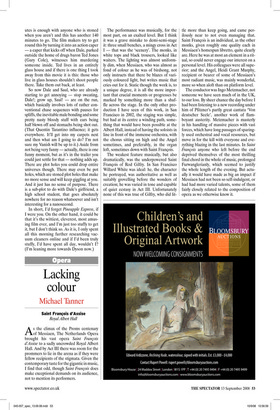What a drag
Deborah Ross
Pineapple Express 15, Nationwide
until, midway through the film, my niece sought me out to ask: ‘Deb, what’s an orgasm?’ Naturally, I sat her down and very calmly said: ‘I know! Let’s play cards!’ I take my materteral duties very seriously, so after cards it was Monopoly, and then bed. Hell, I’m only the aunt in all this; what are the parents for?
Anyway, Pineapple Express, which is basically about two pot-head losers on the run from the mob. And laugh, my dears? I’m sure that if I’d started I’d never have stopped, but as I never started it was hardly an issue. This is a baggy, pointless, tiresome film, which is also messy, puerile, cack-handedly gruesome and plain unfunny. Still, not a complete waste of time as I did manage, at least, to plan a week’s worth of family suppers during the entirely predictable, tediously protracted shoot-out at the end. This, I’m afraid, is what happens to middle-aged housewives when they get bored at the movies. I also did an entire Waitrose shop in my head, and thought some more about the replacement vacuum cleaner we so need (Miele, I’m now thinking, rather than Dyson).
It is scripted by Evan Goldberg and Seth Rogen, who starred in both Superbad and Knocked Up — he gives good chubby schlub, I would say — and stars in this as chubby schlub Dale, a process server who is almost perpetually stoned and buys his weed from Saul (James Franco), who has just come into possession of a rare new strain called Pineapple Express. According to Dale, once he’s put his nose into the bag, Pineapple Express is so good it smells of ‘God’s vagina’. I do not know how he would know this, as the scent of God’s vagina is not mentioned in the Bible, as far as I know. On the other hand, perhaps it is and it’s just that my aunt never told me. I did play a lot of Monopoly with my aunt.
The first ten minutes are okay, and even quite amiable really, as Dale (who sweats a lot) and Saul (childlike and addled) shoot the breeze in their dopey way, but ten min utes is enough with anyone who is stoned when you aren’t and this has another 140 minutes to go. The film makers try to get round this by turning it into an action caper — a caper that kicks off when Dale, parked outside the home of drugs baron Ted Jones (Gary Cole), witnesses him murdering someone inside. Ted lives in an entirely glass house and if there is one thing I took away from this movie it is this: those who live in glass houses shouldn’t shoot people there. Take them out back, at least.
So now Dale and Saul, who are already starting to get annoying — stop sweating, Dale!; grow up, Saul! — are on the run, which basically involves lots of rather conventional chase sequences with pauses for spliffs, the inevitable male bonding and some pretty nasty bloody stuff with ears being half blown off and stomachs being shot out. (That Quentin Tarantino influence; it gets everywhere. It’ll get into my carpets next and then what am I going to do? I’m not sure my Vanish will be up to it.) Aside from not being very funny — actually, there is one funny moment, but as it’s in the trailer you could just settle for that — nothing adds up. There are plot holes you could drop entire universes though. There may even be pot holes, which are stoned plot holes that make no more sense and will keep giggling at you. And it just has no sense of purpose. There is a sub-plot to do with Dale’s girlfriend, a high school student, that goes absolutely nowhere for no reason whatsoever and isn’t interesting for a nanosecond.
In short, I’d forget Pineapple Express, if I were you. On the other hand, it could be that it’s the wittiest, cleverest, most amusing film ever, and I’m just too stuffy to get it, but I don’t think so. As it is, I only spent all this morning further researching vacuum cleaners online and if I’d been truly stuffy, I’d have spent all day, wouldn’t I? (I’m leaning more towards Dyson now.) The performance was musically, for the most part, on an exalted level. But I think it was a grave mistake to demi-semi-stage it: three small benches, a mingy cross in Act I — that was the ‘scenery’. The monks, in white tops and black trousers, looked like waiters. The lighting was almost uniformly dim, when Messiaen, who was almost as fond of colour as he was of birdsong, not only instructs that there be blazes of variously coloured light, but writes music that cries out for it. Static though the work is, to a unique degree, it is all the more important that crucial moments or progresses be marked by something more than a shuffle across the stage. In the only other production I have seen of this work, in San Francisco in 2002, the staging was simple, but had at its centre a winding path, something that would have been possible at the Albert Hall, instead of having the soloists in line in front of the immense orchestra, with the chorus sitting on high and the Angel sometimes, and preferably, in the organ loft, sometimes down with Saint François.
The weakest feature musically, but also dramatically, was the underpowered Saint François of Rod Gilfry. In San Francisco Willard White was ideal: he, the character he portrayed, was authoritative as well as suitably grovelling before the wonders of creation; he was varied in tone and capable of quiet ecstasy in Act III. Unfortunately none of this was true of Gilfry, who did lit tle more than keep going, and came perilously near to not even managing that. Saint François is an individual, as the other monks, given roughly one quality each in Messiaen’s homespun libretto, quite clearly are. Here he was at most an element in a ritual, so could never engage our interest on a personal level. His colleagues were all superior; and the Angel, Heidi Grant Murphy, recipient or bearer of some of Messiaen’s most radiant music, was mainly wonderful, more so when aloft than on platform level.
The conductor was Ingo Metzmacher, not someone we have seen much of in the UK, to our loss. By sheer chance the day before I had been listening to a new recording under him of Pfitzner’s partly great cantata ‘Von deutscher Seele’, another work of flamboyant austerity. Metzmacher is masterly in his handling of massive pieces with vast forces, which have long passages of sparingly used orchestral and vocal resources, but move in for the kill with everyone and everything blazing in the last minutes. In Saint FranVois anyone who left before the end deprived themselves of the most thrilling final chord in the whole of music, prolonged Furwanglerianly, which seemed to justify the whole length of the evening. But actually it would have made as big an impact if Messiaen had not been so self-indulgent, or had had more varied talents, some of them fairly closely related to the composition of opera as we otherwise know it.











































































 Previous page
Previous page